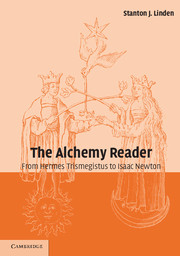Book contents
- Frontmatter
- Contents
- List of illustrations
- Acknowledgments
- List of abbreviations
- Illustrations
- Introduction
- Part I Ancient texts
- Part II Islamic and medieval texts
- Part III Renaissance and seventeenth-century texts
- 18 PARACELSUS (1493–1541): From Of the Nature of Things and Paracelsus His Aurora
- 19 FRANCIS ANTHONY (1550–1603): Aurum-Potabile: or the Receit of Dr. Fr. Antonie
- 20 MICHAEL SENDIVOGIUS (1566–1636 or 1646): From A New Light of Alchymie and A Dialogue between Mercury, the Alchymist and Nature
- 21 ROBERT FLUDD (1574–1637): From the Mosaicall Philosophy
- 22 GABRIEL PLATTES (first half of seventeenth century): A Caveat for Alchymists
- 23 JOHN FRENCH (1616?–1657): Preface to The Divine Pymander of Hermes Mercurius Trismegistus in XVII Books
- 24 GEORGE STARKEY/EIRENAEUS PHILALETHES (1628–1665?): The Admirable Efficacy, and almost incredible Virtue of true Oyl; From An Exposition Upon Sir George Ripley's Epistle to King Edward IV
- 25 ELIAS ASHMOLE (1617–1692): From the “Prolegomena” to the Theatrum Chemicum Britannicum
- 26 ROBERT BOYLE (1627–1691): From An Historical Account of a Degradation of Gold Made by an Anti-Elixir: A Strange Chymical Narative
- 27 SIR ISAAC NEWTON (1642–1727): The Key (Keynes MS 18); The Commentary on the Emerald Tablet (Keynes MS 28)
- Glossary
- Bibliography
- Index
22 - GABRIEL PLATTES (first half of seventeenth century): A Caveat for Alchymists
Published online by Cambridge University Press: 05 October 2014
- Frontmatter
- Contents
- List of illustrations
- Acknowledgments
- List of abbreviations
- Illustrations
- Introduction
- Part I Ancient texts
- Part II Islamic and medieval texts
- Part III Renaissance and seventeenth-century texts
- 18 PARACELSUS (1493–1541): From Of the Nature of Things and Paracelsus His Aurora
- 19 FRANCIS ANTHONY (1550–1603): Aurum-Potabile: or the Receit of Dr. Fr. Antonie
- 20 MICHAEL SENDIVOGIUS (1566–1636 or 1646): From A New Light of Alchymie and A Dialogue between Mercury, the Alchymist and Nature
- 21 ROBERT FLUDD (1574–1637): From the Mosaicall Philosophy
- 22 GABRIEL PLATTES (first half of seventeenth century): A Caveat for Alchymists
- 23 JOHN FRENCH (1616?–1657): Preface to The Divine Pymander of Hermes Mercurius Trismegistus in XVII Books
- 24 GEORGE STARKEY/EIRENAEUS PHILALETHES (1628–1665?): The Admirable Efficacy, and almost incredible Virtue of true Oyl; From An Exposition Upon Sir George Ripley's Epistle to King Edward IV
- 25 ELIAS ASHMOLE (1617–1692): From the “Prolegomena” to the Theatrum Chemicum Britannicum
- 26 ROBERT BOYLE (1627–1691): From An Historical Account of a Degradation of Gold Made by an Anti-Elixir: A Strange Chymical Narative
- 27 SIR ISAAC NEWTON (1642–1727): The Key (Keynes MS 18); The Commentary on the Emerald Tablet (Keynes MS 28)
- Glossary
- Bibliography
- Index
Summary
In 1655, Samuel Hartlib, the educational reformer and friend of Milton and Pepys, published a small collection of miscellaneous tracts entitled Chymical, Medicinal, and Chyrurgical Addresses. One exception to the general anonymity of the nine works he included is Gabriel Plattes's short piece bearing the long title, A Caveat for Alchymists, or, a Warning to all ingenious Gentlemen, whether Laicks or Clericks, that study for the finding out of the Philosophers Stone; shewing how that they need not to be cheated of their Estates, either by the perswasion of others, or by their own idle conceits. Very little is known about Plattes, other than that he, like Hartlib, was interested in improving the practical arts of agriculture and mining and published a few titles on these topics before the Restoration. He is said to have died in poverty and neglect (see the DNB, s.v. “Plattes, Gabriel”). Plattes makes his didactic purpose in writing the Caveat abundantly clear at the beginning and end of the tract; we suspect, however, that entertainment – including a wholly unsatisfactory summary of Chaucer's Canon's Yeoman's Tale in the “fourth Cheat” – was no less important. The text, slightly abbreviated and modernized, is taken from Hartlib's collection.
- Type
- Chapter
- Information
- The Alchemy ReaderFrom Hermes Trismegistus to Isaac Newton, pp. 199 - 207Publisher: Cambridge University PressPrint publication year: 2003



